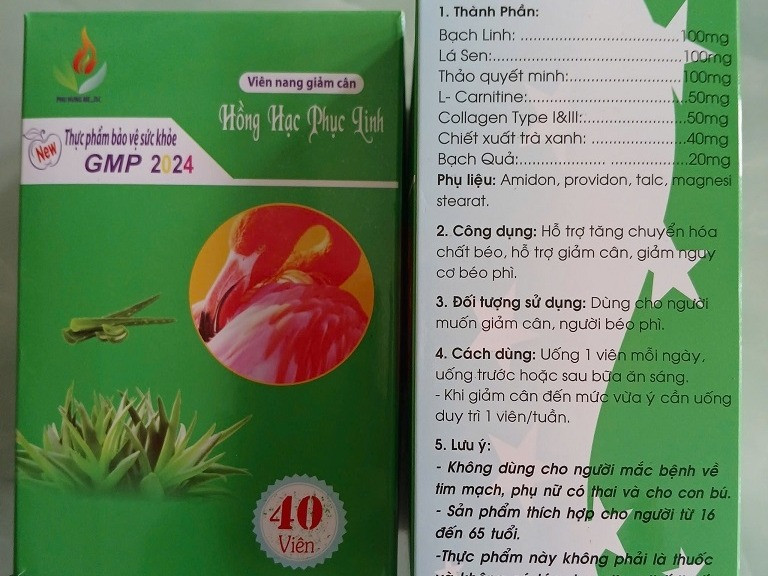
On May 12, the Hanoi Center for Drug, Cosmetics, and Food Testing inspected Duc Anh Pharmacy (Duc Anh Pharmaceutical and Medical Equipment Co, Ltd, Dong Da District, Hanoi) found seven drugs with unclear origin, lacking registration numbers or import permits.
Of these, NEXIUM 40mg Enteric Coated Pellet Tablet (Esomeprazole), for treating gastric reflux, batch number 23H420, expiration date September 2027, containing only 6.91mg of Esomeprazole (17.27 percent of the labeled content), was confirmed as counterfeit.
Another drug, DIAMICRON MR 60mg (Gliclazide), batch number 23F603, expiration date April 2026, was found failing to meet the standards for circulation, with testing showing a Gliclazide content of 42.5mg per tablet (70.83 percent of the labeled content).
At AnAn Pharmacy (No153, Residential Group 14, Kien Hung Ward, Ha Dong, Hanoi), authorities detected counterfeit Theophylline Extended Release 200mg (Theophylline 200mg), batch number 21127, manufactured on February 26, 2022, expiration date February 26, 2026, by Pharmacy Laboratories Plus. The drug contained only 6.3 percent of the declared active ingredient, lacked a Vietnamese secondary label, and had unclear production origin.
Not only drugs, functional foods sold at pharmacies are also a major concern. Nhat Ngan Pharmacy (Lot 13, Cho Gao Commercial Center, Cho Gao District, Tien Giang) was found selling Hong Hac Phuc Linh weight loss capsules containing banned substances of Sibutramine, Desmethylsibutramine, and Didesmethylsibutramine, prohibited in food products due to health risks.
Prior to that, functional foods with banned Sibutramine were discovered at many drug stores, such as TIGI MAX PLUS health supplements (Nhat Tan Pharmacy, 115 Tran Hung Dao, Ward 1, Tuy Hoa, Phu Yen) and loss Weight PhucLinh Collagen (Thien An Pharmacy, Hung Vuong Street, Quarter 2, Trang Bom Town, Dong Nai).
How can counterfeit drugs be sold openly?
Under current regulations, functional foods are classified into four categories: dietary supplements, health supplements, medical nutritional foods, and foods for special dietary needs.
Chu Quoc Thinh, Deputy Director of the Food Safety Department under the Ministry of Health, said dietary supplements require only safety parameter testing for self-declaration dossiers, while nutritional foods and special dietary foods lack quality control. Only health supplements are required tests for quality, but their declaration process is "very simple."
Limited resources make it hard to inspect all health supplements after they are launched into the market. Some manufacturers exploit loopholes of the self-declaration mechanism, bypass regulations, introducing substandard or banned-substance-containing products to the market.
Ta Manh Hung, Deputy Director of the Drug Administration of Vietnam, noted that drugstores buy and sell drugs without invoices or clear origins, which is the main reason for counterfeit drugs entering legal distribution. Many facilities fail to comply with storage rules or source from licensed suppliers, increasing risks of compromised drug quality.
Meanwhile, current penalties lack deterrence. Criminal penalties apply only to producing or trading counterfeit goods (including drugs) valued at VND30 million or more. Administrative fines for trading counterfeit goods are low due to the typically low retail value of drugs (under VND1 million).
For example, a pharmacy selling counterfeit Clorocid TW 3, displaying only 2-3 vials at about VND30,000 each, faces fines of VND2-6 million.
Drugstores dealing in goods of unknown origin valued under VND1 million face warnings or fines of VND600,000-1 million, with confiscation or destruction of goods.
Tighter control, heavier sanctions
Deputy Minister of Health Do Xuan Tuyen, at the seminar “Counterfeit Drugs - Real Consequences,” stressed that drugs and functional foods, as products directly affecting public health, require strict penalties to deter counterfeit production and trade.
The Ministry of Health reported to the Prime Minister who approved the proposal to increase administrative and criminal penalties for producing and trading counterfeit drugs and functional foods. The Food Safety Department is drafting amendments to Decree 15/2018 to enhance post-market surveillance and address loopholes.
Deputy Director of the Food Safety Department Chu Quoc Thinh said his agency is proposing a control model similar to the US Food and Drug Administration (FDA) and other countries, i.e., strict pre-checking of dossiers and regular post-checking and surprise post-checking.
That is, after the enterprise makes declarations about drug products, a competent authority will have to review records and take market samples to check the actual quality, especially for health food products.
At the same time, surprise inspections should increase, based on feedback from consumers, the press or competent authorities. The testing system is also assigned the task of proactively monitoring the market, instead of just checking according to order as it is now.
Vo Thu